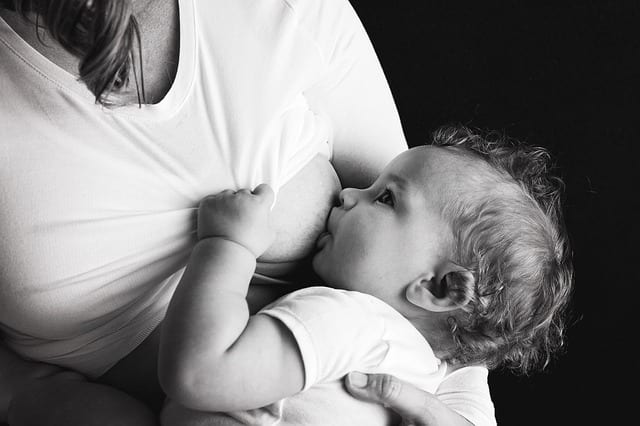
Everyone’s talking about infant formula today.
And well they should– America’s formula shortage has become a crisis. We all ought to be paying attention. But the problem with paying attention is that everybody has an opinion, and most of those opinions are terrible. I have seen terrible opinion after terrible opinion on formula lately. Some of the worst come from Catholic circles. I’m not going to call out anybody by name, but there are quite a few naive people, most of them men who have never produced a drop of milk from a nipple, opining that all the parents desperately searching for formula should just breastfeed. They seem to think a woman who’s currently not lactating can somehow activate a switch to make the milk pour out, which is an interesting notion.
One particularly odious Catholic talking head opined, “I would also say that this is a wakeup call to become more self-sufficient– God literally designed mothers to feed their babies.”
I don’t think those people are listening to me, but in case they are: gentlemen? Hello. I’m a mom who breastfed. I was good at it, too. I have something to say.
I am a hippie mom who attachment parented and ecological breastfed. For me, the milk came in like a volcano when she was a week old and it didn’t stop. I had to stuff pads in my bra. Some mornings I would wake up completely engorged and desperately try to wake Rose and get her her feeding before I had a letdown and made a mess. I could nurse Rose anywhere: in bed, on the sofa, at church, propped up on the Boppy while I sat at the computer. Once I was so exhausted I answered the door to accept a meal and a “congratulations” from one of Michael’s bachelor friends from college, and only after he left did I realize my nursing tank was open and I’d been flashing him the whole time.
I went on breastfeeding Rose for years. We practiced infant-led weaning; she’d take some solid food when she showed an interest and I’d agonize over every bite in case of an allergy, and then she’d want to wash it down with what she called “mookie.” After awhile she got most of her calories from solid food, but she still breastfed before bed the last few months, and then she gave it up on her own. That was what I chose to do. It worked well for us.
But I still needed formula.
When I was in the hospital, recovering from that agonizing traumatic childbirth I’d already told you about, my milk didn’t come in when it was supposed to. And the colostrum wasn’t coming out the way it was expected to do. You see, it turns out that breasts aren’t machines you can turn on with perfect efficiency. They are body parts, and body parts aren’t that predictable. Sometimes, particularly after a traumatic childbirth, they don’t lactate when they’re supposed to. There were wonderful lactation consultants at the hospital who tried everything they could to help me. They brought a pump and I pumped for the longest time. But I could barely make a trickle. And Rose was an enormous baby, born at the ninety-ninth percentile for a newborn. She needed calories. She was ravenous. She was frantic.
The lactation consultants were the ones who broke out the formula.
I didn’t want formula. I’d been bullied and bossed around for the past nine months by overbearing people who told me that formula would interfere with breastfeeding. But the lactation consultants assured me that they knew what they were doing. I let Rose suck on my dry nipples for a certain amount of time, and then I fed her a shotglass-sized portion of formula from a tiny plastic cup. We repeated that as necessary, until the day I woke up engorged. The rest would not have happened without the formula.
That’s my story. That’s what I ended up doing, because I chose to, and because it worked out best for me. If you’re going to belittle a woman for using formula, come over here and belittle me while I laugh at you.
Other people have other stories. They had to do other things than I ended up doing, because there weren’t such dedicated lactation consultants at the hospital, or because their bodies didn’t produce enough milk, or because they had to work a nine to five and there was no place to pump at work, or because pumping is actually very difficult and doesn’t produce a lot, or for other reasons. In another era, these moms would have had to find someone to wet nurse the baby. Or else they would have had to bring the baby up “by hand,” feeding them cow or goat milk with flour or breadcrumbs in it on a spoon. Babies brought up by hand were a lot more susceptible to all the illnesses you can catch from food in the times before pasteurization and refrigeration. Besides the germs, babies brought up by hand were malnourished, because plain cow’s milk isn’t the right blend of nutrients for a baby. Their bowels got injured because cow’s milk and wheat flour are awfully hard on the intestines of a child under one year of age, and then they could absorb even fewer nutrients. A lot of those babies died, and those who lived often grew up to be sickly.
Nowadays, those moms use formula. Formula doesn’t carry the dangers of bringing up by hand. The babies do well and usually grow up healthy, just as Rose has grown up to be healthy so far.
And that’s assuming that the biological mother is raising the child in the first place. It’s not even bringing up the subject of adoptive parents. Sure, it’s possible for an adoptive mom to take hormones or use a supplemental nursing system to start lactating, and if they want to try to do that, that’s a great choice for them. But it doesn’t always work, and when it does it doesn’t necessarily produce enough milk. And then there are foster moms who need to take care of a baby for a few days or weeks in an emergency. Those moms aren’t going to breastfeed. How could they? And then there are the situations where there isn’t a mom in the picture at all. Maybe the baby needs to be brought up by their father alone, or by grandparents or an uncle or in any other situation where there isn’t a lactating woman in the picture. And none of these childrearing situations is new or unusual. They’ve all happened at one time or another through history. Before the invention of infant formula, these babies, too, were either wet nursed or brought up by hand. And the ones brought up by hand suffered terribly. Today, we have formula. Because of formula, those babies live.
Formula is a good thing.
Formula keeps babies from dying. It is, dare I say, pro-life. We Catholics are supposed to want that.
Of course, it’s easier to ridicule people whose struggles you know nothing about.
Steel Magnificat operates almost entirely on tips. To tip the author, visit our donate page.













